 W
WCao Cao, courtesy name Mengde, was a Chinese warlord, statesman and poet. He was the penultimate grand chancellor of the Eastern Han dynasty who rose to great power in the final years of the dynasty. As one of the central figures of the Three Kingdoms period, he laid the foundations for what was to become the state of Cao Wei and ultimately the Jin dynasty, and was posthumously honoured as "Emperor Wu of Wei" although he never was an emperor during his life time. He remains a controversial historical figure, and is often portrayed as a cruel and merciless tyrant in subsequent literature; however, he has also been praised as a brilliant ruler and military genius with unrivalled charisma who treated his subordinates like his family.
 W
WChao Yuen Ren, also known as Zhao Yuanren or Yuen Ren Chao was a Chinese-American linguist, educator, scholar, poet, and composer, who contributed to the modern study of Chinese phonology and grammar. Chao was born and raised in China, then attended university in the United States, where he earned degrees from Cornell University and Harvard University. A naturally-gifted polyglot and linguist, his Mandarin Primer was one of the most widely used Mandarin Chinese textbooks in the 20th century. He invented the Gwoyeu Romatzyh romanization scheme, which, unlike pinyin and other romanization systems, can transcribe Mandarin Chinese pronunciation without needing diacritics to indicate tones.
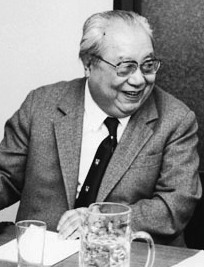 W
WFei Xiaotong or Fei Hsiao-Tung was a Chinese anthropologist and sociologist. He was a pioneering researcher and professor of sociology and anthropology; he was also noted for his studies in the study of China's ethnic groups as well as a social activist. One of China's finest sociologists and anthropologists, his works on these subjects were instrumental in laying a solid foundation for the development of sociological and anthropological studies in China, as well as in introducing social and cultural phenomena of China to the international community. His last post before his death in 2005 was as Professor of Sociology at Peking University.
 W
WFu Shanxiang was a Chinese scholar from Nanjing who became Chancellor under the Taiping Heavenly Kingdom, which was nearly successful in its attempts to overthrow the Qing dynasty in the 1850s. Fu is known as the first female Zhuangyuan in Chinese history.
 W
WGao Yu is a Chinese journalist and dissident who has been repeatedly imprisoned.
 W
WHuang Yanpei was a Chinese educator, writer, and politician. He was a founding pioneer of the China Democratic League.
 W
WJi Kang, sometimes referred to as Xi Kang, courtesy name Shuye, was a Chinese writer, poet, Daoist philosopher, musician and alchemist of the Three Kingdoms period. He was one of the Seven Sages of the Bamboo Grove who held aloof from the dangerous politics of third-century China to devote themselves to art and refinement.
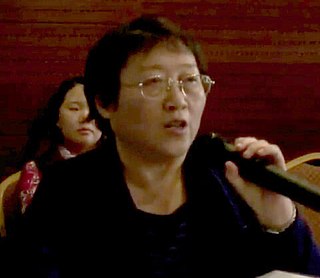 W
WLi Yinhe is a sociologist, sexologist, and activist for LGBT rights in the People's Republic of China. Her main academic interests have been sexual norms in contemporary China, homosexuality, diverse sexual behaviors including sadomasochism, and women's studies.
 W
WLiang Fa (1789–1855), also known by other names, was the second Chinese Protestant convert and the first Chinese Protestant minister and evangelist. He was ordained by Robert Morrison, the first Protestant missionary in the Qing Empire. His tract Good Words to Admonish the Age was influential on Hong Xiuquan, who went on to lead the Taiping Rebellion.
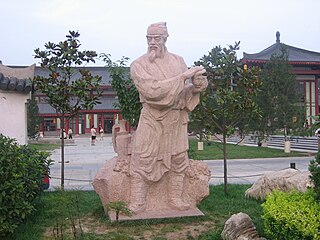 W
WLu Yu was a Chinese tea master and writer. He is respected as the Sage of Tea for his contribution to Chinese tea culture. He is best known for his monumental book The Classic of Tea, the first definitive work on cultivating, making and drinking tea.
 W
WMoy Yat (梅逸) was a Hong Kong martial artist, painter, seal maker, teacher and author. He was a student of the legendary Wing Chun Kung-Fu teacher Yip Man from 1957 until Ip Man's death in 1972. Moy Yat is survived by his wife, Helen and his children Vieven, William and Viva. He also has Grandchildren and devoted students which are still alive.
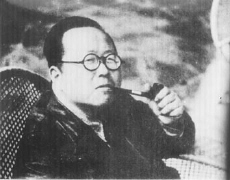 W
WPan Guangdan known in English as Quentin Pan, was a Chinese sociologist, eugenicist, and writer. He was one of the most distinguished sociologists and eugenicists of China. Educated at Tsinghua University on a Boxer Indemnity Scholarship, Dartmouth College and Columbia University, where he was trained by Charles B. Davenport, Pan was also a renowned expert on education. His wide research scope included eugenics, education policy, matrimony policy, familial problems, prostitute policy, and intellectual distributions. Pan's wide-ranging intellect led to his active participation in the Crescent Moon Society.
 W
WSun Simiao was a Chinese physician and writer of the Sui and Tang dynasty. He was titled as China's King of Medicine for his significant contributions to Chinese medicine and tremendous care to his patients.
 W
WWang Ji (1463-1539) was a Ming physician who published an early medical casebook.
 W
WWang Huangsheng is a Chinese-born artist, curator and educator who is currently residing in Beijing. He used to serve as the director of China Central Academy of Fine Arts Museum for eight years. As an artist, he is most known for his ink paintings as well as installations. He is currently a Professor of China Central Academy of Fine Arts.
 W
WWen Yiduo was a Chinese poet and scholar known for his nationalistic poetry who was assassinated by the Kuomintang.
 W
WDoc-Fai Wong (黄德輝) is recognized internationally as a master of the Hung Sing branch of Choy Li Fut kung fu and T'ai chi ch'uan. He was born in 1948 in the Guangdong (广东) province of China; the Wangshan village of Wushan - Doumen district of Zhuhai City. In April 1960, he immigrated to San Francisco, California with his mother to be reunited with his father. He arrived as a third-generation citizen of the United States of America since both his grandfather and father were already citizens. He sought out his first kung fu teacher - Lau Bun (劉彬), the founder of the first Hung Sing Kwoon of Choy Li Fut in America, after encountering taunting and bullying due to language and ethnic difficulties after his arrival. When Lau Bun died in 1967, he started teaching and opened his first school when he was 19 years old.
 W
WWu Yinghua (1907–1996) was a famous Chinese teacher of Wu-style t'ai chi ch'uan. She was born in Beijing and died in Shanghai. She was the eldest daughter of Wu Chien-ch'uan, the best known teacher of Wu-style t'ai chi ch'uan. Her older brothers were Wu Kung-i and Wu Kung-tsao.
 W
WXie Zifen is a retired Chinese rural economist and senior research fellow with the Shanghai Academy of Social Sciences (SASS).
 W
WYan Xuetong is the distinguished professor and the Dean of the Institute of International Relations, Tsinghua University. In 2008, he was named as one of world's Top 100 public intellectuals by the American journal Foreign Policy. He is the only political scientist listed as Most Cited Chinese Researchers by Elsevier during 2014-2017.
 W
WYuan Zhen, courtesy name Weizhi (微之), was a Chinese poet and politician of the middle Tang Dynasty. In prose literature, Yuan Zhen is particularly known for his work Yingying's Biography, which has often been adapted for other treatments, including operatic and musical ones. In poetry, he is remembered for the inclusion of some of his poems by popular anthologies, his verses on exotic topics, and for being part of the group of "New Yuefu" poets, which often used poetry as a form of expression and protest, but one potentially subtle enough to avoid the likely repercussions of more direct criticism. The poetic circle in which Yuan Zhen was involved included Bai Juyi, among others. Politically Yuan Zhen was briefly chancellor, during the reign of Emperor Muzong.
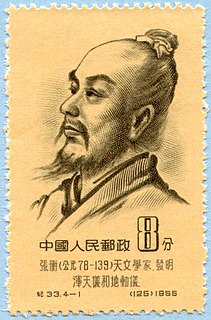 W
WZhang Heng, formerly romanized as Chang Heng, was a Chinese polymathic scientist and statesman from Nanyang who lived during the Han dynasty. Educated in the capital cities of Luoyang and Chang'an, he achieved success as an astronomer, mathematician, seismologist, hydraulic engineer, inventor, geographer, cartographer, ethnographer, artist, poet, philosopher, politician, and literary scholar.
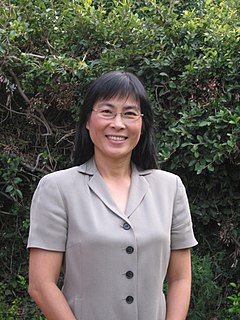 W
WMin Zhou, is a Chinese-born American sociologist.
 W
WZhu Min is a Chinese economist and is Deputy Managing Director of the International Monetary Fund. He was the inaugural Special Advisor to the Managing Director. Zhu has held senior positions Bank of China from 2003 to 2009 and was a Deputy Governor of the People's Bank of China from 2009 to 2010.